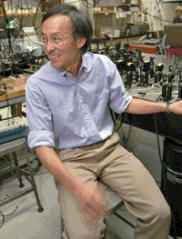|
|
|
|
|
|
|
News & Views item - March 2009 |
![]() Steven Chu Gets an Undersecretary and Talks to Kevin Rudd. (March 26, 2009)
Steven Chu Gets an Undersecretary and Talks to Kevin Rudd. (March 26, 2009)
US Energy Secretary and Physics Nobel Laureate Steven Chu makes good
copy. A recent article in The New York Times notes that: "Matt Rogers,
an energy expert with McKinsey & Company whom Dr. Chu brought in last month to help speed the pace of
Energy Department spending, said it would be a mistake to dismiss Dr. Chu as
just a science geek. “He is a kind man; he is a nice man,” Mr. Rogers said. “But
he is not a patient man. People are going to have to take a deep breath and
realize they’re going to be moving at a much quicker pace than they were used
to.”
McKinsey & Company whom Dr. Chu brought in last month to help speed the pace of
Energy Department spending, said it would be a mistake to dismiss Dr. Chu as
just a science geek. “He is a kind man; he is a nice man,” Mr. Rogers said. “But
he is not a patient man. People are going to have to take a deep breath and
realize they’re going to be moving at a much quicker pace than they were used
to.”
Now Nature writes that Steven Koonin, the former provost of the California Institute of Technology and current chief scientist of BP, has been selected by US President Barack Obama to serve as undersecretary of science at the Department of Energy.
The US Senate is yet to confirm the appointment.
The appointment is hardly unexpected, and Dr Chu most certainly had a strong hand in it. The two Stevens go back a long way. They were instrumental in setting up the controversial $500-million alliance between BP, the University of California, Berkeley and the University of Illinois at Urbana-Champaign.
The get some idea of the scope of the economic stimulus so far as the Department of Energy's Office of Science is concerned, Science reports that it will get (all sums in US$) $1.6 billion to address a backlog of construction and research projects. $150 million--will go to Brookhaven National Laboratory to speed up construction of its National Synchrotron Light Source II, the Pacific Northwest National Laboratory gets $124 million to equip an environmental molecular sciences lab and a climate research facility, the Lawrence Berkeley National Laboratory (LBNL) gets $115 million for two facilities to support users of its Advanced Light Source, Oak Ridge National Laboratory gets $71 million for a multipurpose facility to house its chemical and advanced materials research programs, SLAC National Accelerator Laboratory will receive $68 million for equipment and modernization, the Thomas Jefferson National Accelerator Laboratory gets $65 million to complete an upgrade of its Continuous Electron Beam Accelerator Facility, $69 million will help to triple the speed of a 10-gigabit-per-second data network serving all the national labs, and the NO?A neutrino experiment managed by Fermi National Accelerator Laboratory in collaboration with the University of Minnesota will get a $50 million boost.
And Science it catalogue with: "The stimulus funding also provides $277 million to establish roughly a dozen Energy Frontier Research Centers. DOE has already reviewed 260 applications for the new program, which focuses on using basic science to tackle challenges such as solar power or hydrogen energy. Each center, a collaboration between universities and national labs, is expected to receive from $2 million to $5 million for up to 5 years. In addition, DOE's high-energy physics and fusion research programs will get $90 million on top of their regular budgets for competitive grants.
Meanwhile Australia's Prime Minister, Kevin Rudd, in making the Washington rounds stopped by for a short visit with Dr Chu to discuss matters of climate change policy. Whether or not they touched on matters such as support for research pure and applied or how to get the most out of public servants isn't reported.